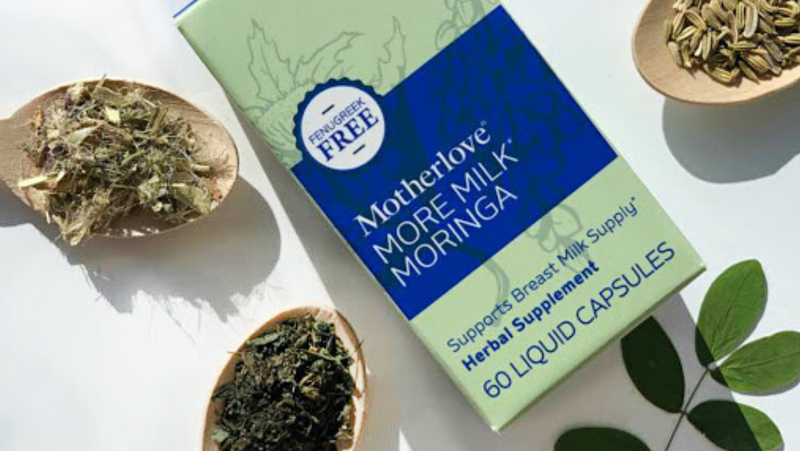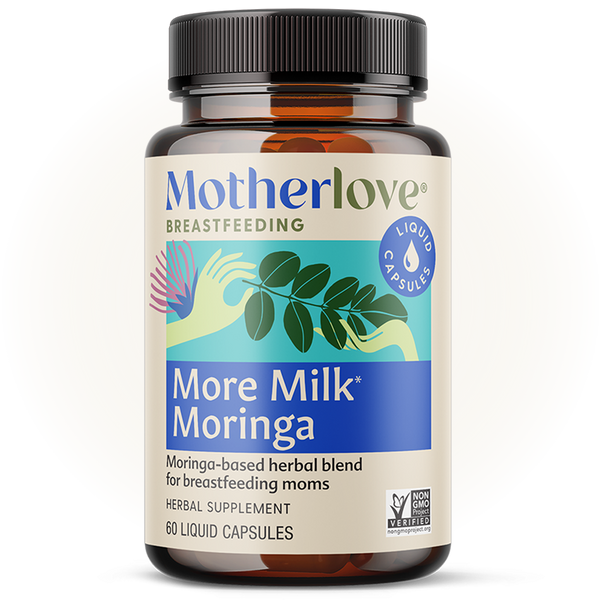Nursing on demand or pumping frequently is the best way to maintain or increase milk supply. However, sometimes life as other plans, and a mom’s milk supply takes a dip due to unforeseen circumstances.
For example, maybe you were separated from your baby due to illness or work. Perhaps your baby had a nursing strike, a stuffy nose, or is refusing the breast for some unknown reason and you are finding it hard to keep up your supply.
Whatever the case, sometimes nursing and pumping alone can’t get your supply to where you need it to be, so you turn to a galactagogue, which as KellyMom defines as, "A substance that increases milk supply is called a galactagogue."
There are so many galactagogues out there and sometimes it can be difficult to pick one that’s right for you. In my work as a lactation consultant (IBCLC), I tend to prefer galactagogues that are simple, time-tested, and as natural as possible. That’s why moringa (malunggay) tops my list of recommended milk supply support for nursing moms.
WHAT IS MORINGA?
One of my favorite things about moringa is that it’s not just a great milk supply booster, but it’s also nutrient-rich food with a ton of other health benefits. Let’s look at some fast-facts about moringa:
- Moringa (moringa oleifera) comes from the leaves of the moringa tree, and has been used for centuries in Asian cultures—particularly in the Philippines—as a food, a vitamin-source, and a healing herb.
- The nutritional content of moringa is impressive, which is why moringa is often used as a vitamin source and supplement in traditional cultures.
Gram for gram, moringa leaves contain:
- 25x the iron found in spinach
- 15x the potassium of bananas
- 17x the calcium of milk
- 10x the vitamin C of carrots
- 9x the protein of yogurt
- 7x the vitamin C of oranges
HOW IS MORINGA USED FOR BREASTFEEDING?
Moringa has been used traditionally for many years. For instance, in the Philippines, moringa’s bright green leaves are prepared as part of a chicken soup that’s used to increase milk supply.
News about the benefits of moringa and breastfeeding spread to the Western world over the past decade or so, and many mothers use moringa to enhance their milk supply. Usually, moringa is consumed in capsule or liquid form. And of course, it can be eaten as a cooked vegetable or as part of a traditional soup.
WHAT DOES THE RESEARCH SAY ABOUT MORINGA AND BREASTFEEDING?
Two studies have found positive correlations between the consumption of moringa and an increase in milk supply.
- In the first study, published in The Philippine Journal of Pediatrics, mothers who delivered prematurely—at 37 weeks gestation or less—were either given moringa or a placebo starting 3 days postpartum. Participants pumped on the same schedule and with similar pump types, but the mothers who took moringa had significantly more milk at 4 and 5 days postpartum. The study researchers concluded: “Moringa oleifera leaves increase milk production on postpartum days 4 to 5 among mothers who delivered preterm infants.”
- Another study, presented at the American Academy of Pediatrics Section on Breastfeeding in 2002, and referenced in the Lactmed section on moringa, also found moringa consumption to positively increase milk production. This study similarly looked at the effects of moringa consumption among moms of premature babies 37 weeks old or less. These moms were either given a placebo, moringa, or the medications domperidone or metoclopramide, with instructions to pump. At 7 and 14 days postpartum, the moms who had taken either moringa, domperidone, or metoclopramide had an increase in milk supply, while those who took the placebo did not.
HOW DO I KNOW IF MORINGA IS RIGHT FOR ME?
The decision about whether to take a supplement to enhance and support your milk supply isn’t one that you should make on your own. It’s best to contact your doctor, midwife, or lactation consultant to help you decide if a supplement like More Milk Moringa or Moringa is right for you and your baby. Again, as a lactation consultant, I have recommended moringa to my clients, and seen positive results with no negative side effects.
There are no known contraindications for moringa consumption while breastfeeding. According to Lactnet, a small study found no adverse effects of consuming moringa on nursing mothers.
Again, if you have any questions about the safety of consuming moringa while breastfeeding, it’s always wise to reach out to a healthcare professional. Motherlove is available to help guide you through their available supplements as well.




